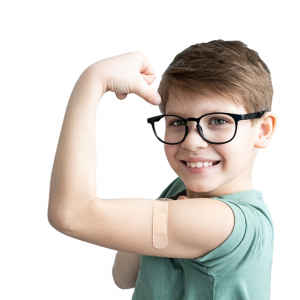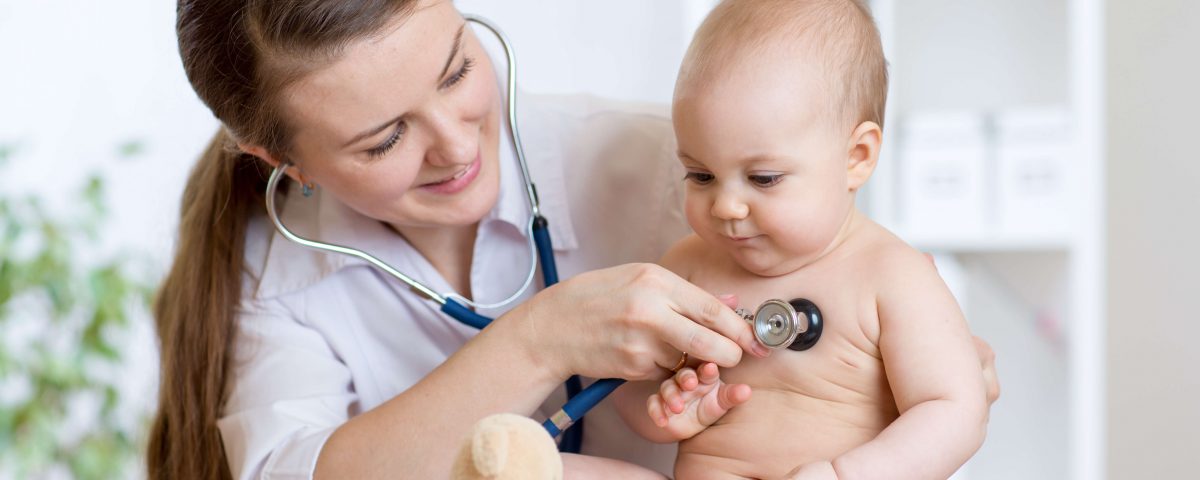
Keeping your Young Athlete Safe!
April 12, 2021
The Covid-19 Vaccine for Children
June 21, 2021Childhood immunizations help protect children and their vulnerable immune systems from serious diseases. Assuring children receive all of their necessary immunizations is one of the most important ways parents can aid in keeping their little ones healthy. The following is a list of vaccines recommended for children:
- Influenza Vaccine: The influenza vaccine, also known as the flu vaccine helps reduce the risk of children being severely affected by flu complications, especially for children under 5 years of age. The influenza vaccine should be administered:
- Yearly, for children six months and older.
- The CDC recommends having your children receive their influenza vaccine by the end of October before flu season reaches its peak.
- Chickenpox (Varicella) Vaccine: The varicella vaccine helps prevent chickenpox, an itchy rash that typically lasts around one week. Fever, loss of appetite, headache, and fatigue are all symptoms attributed to chickenpox. The timeline for this vaccine is:
- First dose – 12 to 15 months of age.
- Second dose – 4 to 6 years of age.
- Rotavirus Vaccine: Rotavirus is a virus that can cause symptoms including; vomiting, diarrhea, fever, abdominal pain, and even lead to dehydration. The Rotavirus vaccine is administered by putting a few droplets in the child’s mouth. Depending on the brand, babies should receive two or three doses of the rotavirus vaccine. The timeline for when the vaccine should be administered is:
- First dose – Before 15 weeks of age.
- Second (last) dose – By 8 months of age.
- Hepatitis A and Hepatitis B Vaccines: Both the Hepatitis A and Hepatitis B vaccines help protect your child from liver diseases. Hepatitis A and B are both liver diseases however, they are transmitted in different ways. Hep A is spread by coming into contact with an infected person or ingested orally. In contrast, Hep B is spread through blood-to-blood or bodily fluid contact. The timeline for when these vaccines should be administered is:
- Hepatitis A (First dose) – 12 months of age through 23 months of age.
- Hepatitis A (Second dose) – 6 months after receiving the first dose.
- Hepatitis B (First dose) – At birth, receiving 2, 3, or 4 shots by 6 months of age. Note: For some, it may take longer than 6 months to complete the series of vaccines needed for Hep B.
- Haemophilus Influenza type B (HIB) Vaccine: The HIB vaccine helps prevent children from contracting the Haemophilus virus. Symptoms from HIB bacteria can be mild, such as ear infections to more severe illnesses like infections in the bloodstream, pneumonia, and severe swelling in the throat. The timeline for when the HIB vaccine should be administered is:
- First dose- 2 months of age, receiving up to 3-4 doses by 12-15 months of age.
- Pneumococcal (PCV13) Vaccine: The pneumococcal vaccine helps prevent diseases from pneumococcal bacteria. Symptoms associated with pneumococcal bacteria include; pneumonia, meningitis, sinus infections, ear infections, and bacteremia (infections of the bloodstream). The timeline for when children should receive their PCV13 vaccine is:
- This vaccine is usually given in 4 doses and should be administered at 2,4,6, and 12-15 months of age.
- Meningococcal Vaccine: The meningococcal vaccine helps prevent diseases from a bacteria called Neisseria Meningitis. This type of bacteria can lead to meningitis, which is an infection of the lining of the brain and spinal cord. The timeline for this vaccine is:
- Two doses of the MenACWY vaccine for adolescents 11-12 years old, and a booster dose at 16. This vaccine is recommended for children between the ages of 11-18.
- DTap and TDap Vaccines: The DTap and TDap vaccines help prevent three deadly diseases in children that are caused by bacteria. These bacteria include; diphtheria, tetanus, and pertussis. The timeline for when these vaccines should be administered is:
- DTap- Children should receive 5 doses of the DTap vaccine at the ages of; 2 months, 4 months, 6 months, 15-18 months, and 4-6 years.
- TDap – This vaccine is only for children 7 years of age and older. Preferably, adolescents should receive this vaccine at the age of 11-12.
- Polio Vaccine: The polio vaccine helps prevent poliovirus, a life-threatening disease that affects an individual’s spinal cord. Poliovirus can lead to paralysis, permanent disability, and even death. The timeline for the poliovirus vaccine is:
- First dose – 2 months of age
- Second dose – 4 months of age
- Third dose – 6-18 months of age
- Fourth dose – 4-6 years of age
- Human Papillomavirus (HPV) Vaccine: The HPV Vaccine helps prevent infections from HPV, as well as certain types of cancers associated with HPV, such as; cervical, vulvar, and vaginal cancer in women, penile cancer in men, and anal cancer in both women and men. The timeline for when the HPV vaccine should be administered is:
- 11-12 years of age, but may be given starting at age 9.
- MMR Vaccine: The MMR vaccine helps prevent diseases such as; measles, mumps, and rubella. The timeline for when the MMR vaccine should be administered is:
- First dose – 12 to 15 months of age
- Second dose – 4 to 6 years of age
When it comes to the health of your little one, never leave it up to chance. Call the office of Dr. Alfonso J. Henriquez at 561-275-7100 to schedule your child’s immunizations.





